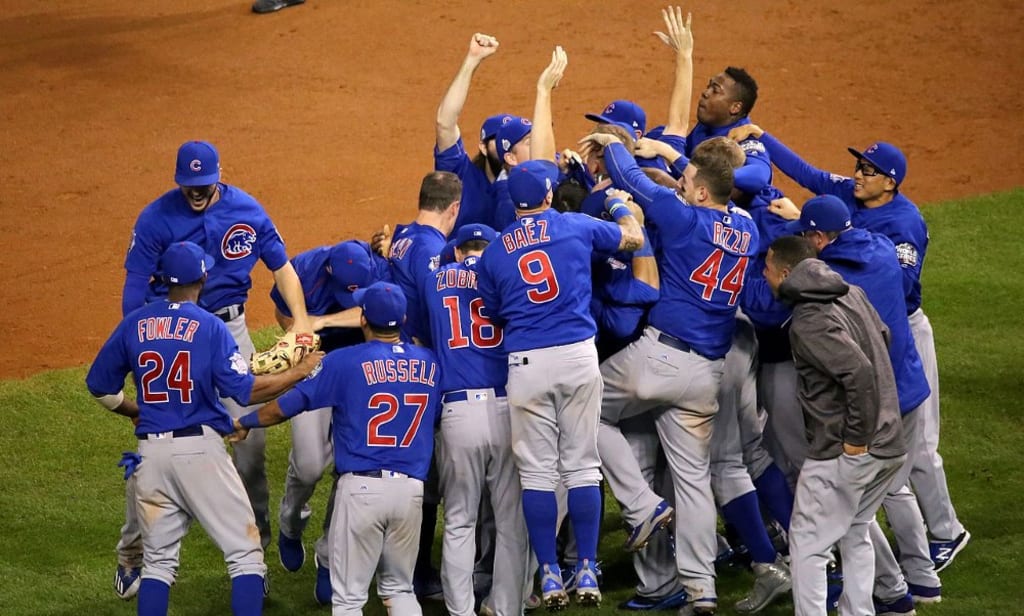The Chicago Cubs Are the World Series Favorites
WAR isn’t everything.

Make no mistake: the Dodgers are a great team. They have Clayton Kershaw, the pitching equivalent of Mike Trout. They have Corey Seager and Justin Turner, two of the best infielders in the National League. They have Kenley Jansen, a lights out closer who has been nothing short of dominant throughout his career. And yes — as my colleague Dylan Svoboda pointed out — they’re predicted to be better (though by a fairly slim margin) than the reigning WS Champs, the Chicago Cubs.
But the Dodgers are not World Series favorites. It’s the Cubs, by a considerable margin.
The crux of this argument is not “The Los Angeles Dodgers are the better team.” According to Fangraphs’ projections, they will be (if only by a slim margin). Rather, the crux of this argument is that the Cubs’ path to the playoffs is less difficult than the Dodgers’, and their path through the playoffs is even easier.
Determining who goes to the playoffs has become significantly more difficult since the ‘golden days’ of baseball. It used to be that the best team by W/L in the NL would face off against the best team by W/L in the AL in the World Series, with no silly championship series or division series required. Were this 1950, the Dodgers’ WAR projections would probably lead them to be the genuine World Series favorites (although anyone practicing the dark arts of sabermetrics would have been burned at the stake in those ancient times).
They wouldn’t have been favorites simply on the basis of being the best team, but instead, on the basis of being the team most likely to make it to the World Series. The World Series itself can be considered a coin-flip — there’s not a reliable or precise way (at least to my knowledge) to predict what team is most likely to win a 7-game series, as 7 games is too few games for any reliable, measurable trends to emerge (check, for instance, 538’s MLB World Series predictions). Between the two teams, the best chance of winning a game for either team was 66%, which is only about 15% better than an actual coin flip. That was only for a single game. Predicting the results of a 7-game series 10 months away is even more difficult. A lot can happen in 10 months! But by being the projected best team in our imaginary 1950, the Dodgers have given themselves the best chance of getting to make that coin-flip. By being the team most likely to make the playoffs, the Dodgers are therefore the team most likely to win the playoffs.
Of course, we don’t live in 1950. We live in the 21st century, with flying cars, jet packs, and a 10 team bracketed playoff system. Now, in order to make the playoffs, a team doesn’t need to be the best in the NL or AL. A team just needs to be the best in their division (or win the wildcard game). But despite this, the postulate that “to have the best chance of winning the playoffs, a team must have the best chance of getting to the playoffs” holds true.
Are the Dodgers the best team in their division? Of course, they’re the best team in baseball. However, hot on their tails are the Giants. The Giants memorably collapsed down the stretch in 2016, allowing the Dodgers to take the division and force the Giants into the wild-card, but both teams were evenly matched in 2016. Now, in 2017, with much of the same players returning, the Dodgers are projected to have the edge in terms of WAR (53.1 to 42.7), but a 10.4 WAR gap could be bridged by slumps, injuries, or breakout performances. The Giants also happened to win the season series against the Dodgers 11–8. Ultimately, the Dodgers will be facing stiff competition for the NL West title, and conversely, a playoff slot. Should the Dodgers lose the division, they could still grab a WC slot, but suddenly, their path to the World Series becomes much shakier.
But how about the Cubbies? The Cubs are projected to accumulate 52.4 WAR in 2017, a mere 0.7 WAR behind the Dodgers. Despite being of comparable caliber to the Dodgers, the difference between the Cubs and the next best team in their division, the Cardinals, is projected to be 13.3 WAR, 2.9 WAR more than the difference between the Dodgers and Giants.
Thus, the Cubs appear to have the advantage in putting distance between themselves and second place. This was evident last season when the Cubs won their division by 17.5 games. The Dodgers barely eeked out their slot in the playoffs with a 4-game cushion in front of the Giants. The gap might have been closer or even reversed if the Giants had a capable closer like Mark Melancon to shut down games. But the Giants have Melancon for 2017, so the race for the NL West could be closer than WAR would suggest (as WAR significantly undervalues closers). But in the NL central, the favorites are very clearly the Cubs.
Thus, by virtue of having the best chance of making the playoffs, the Cubs are the World Series favorites, 10 months out. But there’s much more in the Cubs’ favor than the regular season — the Cubs are built to win in the postseason, not just the regular season.
Generally, in the playoffs, teams have a 3 or 4 man rotation, as opposed to the regular season’s 5 or 6 man rotation. So in a hypothetical playoff scenario, the Dodgers might roll out Kershaw, the best pitcher in baseball, followed by Maeda, Urias, and Hill, who are fine pitchers in their own right,but are only projected to be about average to above average pitchers.
The starting pitcher can dictate the course of the game, which is why 538’s ELO baseball prediction model says that a great starting pitcher can boost a team’s chances of winning a game by 15%. That’s a huge bump for a team, and it’s vital for the playoffs. However, the Dodgers can only run out Kershaw for so many games. Whenever Kershaw’s not pitching, the Dodgers have to rely on league average pitchers. Hell, even if Kershaw’s pitching, there’s no guarantee regular season Kershaw will appear and postseason Kershaw won’t. The Dodger’s pitching staff isn’t built for the postseason — which is why, despite winning the NL West every year for the past 4 years, they’ve yet to win a pennant.
But the Cubs are built for the postseason. Their top 4 pitchers all performed excellently in 2016, if not quite to Kershaw’s level, and most of them are projected to repeat their performance (Hendricks’ projection is a bit of an undershoot as he’s the type of pitcher who outperforms his FIP). This is crucial because it gives the Cubs a steady bonus to their odds of winning in every single game. The Dodgers have the Kershaw factor for every game he starts, but he can only realistically start 25% or 33% of the time in the playoffs. The Cubs are running out fairly good, if not ace-level, pitchers every single game. This kind of depth wins playoffs. And Jon “2.63 career postseason ERA” Lester doesn’t hurt things much either.
Succinctly, the Dodgers’ rotation gives them a large advantage in games where Kershaw starts, but they lack a pitching advantage when rolling out the rest of their staff. The Cubs don’t have any one pitcher that gives them an advantage like Kershaw does, but their rotation can win the games against the average, middle of the rotation pitchers — which ultimately, are the pitchers a team faces most often in the playoffs.
Of course, predictions like these won’t always be accurate. Like I’ve said before: the World Series is about 10 months away. A lot can happen in that time — look at 2016. Kyle Schwarber missed the entire season due to injury. Kershaw, who has never missed significant time for injury, went down for a few months. Jason Heyward stunk to high heaven. Nobody saw any of that coming, but it still happened. But based on what we know now, and what we can predict empirically, it looks like the Cubs have the best chance of winning the 2017 crown. This isn’t saying that the odds of the Cubs winning the World Series are extraordinarily large — they’re just larger than everyone else.
About the Creator
John Edwards
Staff Writer for The Unbalanced, Contributor at Sporting News.






Comments
There are no comments for this story
Be the first to respond and start the conversation.